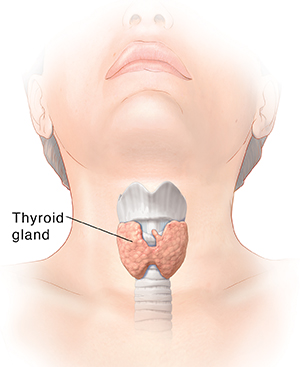What Is Thyroid Cancer?
Cancer happens when cells in the body change and grow out of control. These cells can form lumps of tissue called tumors. Cancer that starts in cells of the thyroid is called thyroid cancer. It's also called thyroid carcinoma.
Understanding the thyroid
The thyroid is a small, butterfly-shaped gland in front of the neck, just below the Adam's apple. The thyroid has 2 lobes. A thin piece of tissue also connects them (isthmus). The thyroid makes hormones for the body to function correctly. The thyroid controls the rate at which every part of the body works. This is called metabolism . The thyroid gland regulates the metabolism by making thyroid hormones (thyroxine or T4 and triodothyronin or T3), a chemical that carries messages from the thyroid to the rest of the body through the bloodstream. The thyroid also makes the hormone called calcitonin. This regulates the level of calcium in the blood and how it is used in the body.

When thyroid cancer forms
Cells in the thyroid may grow out of control, forming small lumps called nodules. But most thyroid nodules aren't cancer. The thyroid may also enlarge (swell). Thyroid cancer can spread from the thyroid to other parts of the body. This spread is called metastasis. In general, the more cancer spreads, the harder it is to treat.
There are 5 main types of thyroid cancer:
-
Papillary thyroid cancer, which is the most common type
-
Follicular thyroid cancer
-
Hurthle cell cancer
-
Medullary thyroid cancer
-
Anaplastic thyroid cancer
Treatment choices for thyroid cancer
You and your healthcare provider will discuss a treatment plan that's based on your type of cancer and your personal needs. Treatment choices may include:
-
Surgery. This removes part or all of the thyroid gland. Some surrounding healthy tissue (called the margin) may also be removed.
-
Radioiodine therapy. This uses radioactive iodine to destroy thyroid cancer cells in the body. To prevent others from being exposed to the radiation, you may need to stay in the hospital for several days.
-
External radiation therapy. This uses high-energy X-rays directed right at the tumor to kill cancer cells.
-
Thyroid hormone therapy. This blocks or removes the hormones that help the cancer grow.
-
Chemotherapy. This uses strong medicines to kill cancer cells all over the body.
-
Targeted therapy. This targets and attacks the specific cancer cells' genes or proteins that allow cancer growth and survival.
-
Watchful waiting with frequent healthcare checkups. This is done to look for any problems or symptoms that have occurred since your last appointment.
-
Clinical trials. These are research studies that test new ways to treat cancer. Ask your healthcare provider if a clinical trial could be an option for you.
Write down any questions you have about thyroid cancer and bring them with you when you talk with your provider. They can help you understand more about this cancer.
Online Medical Reviewer:
Jessica Gotwals RN BSN MPH
Online Medical Reviewer:
Rita Sather RN
Online Medical Reviewer:
Susan K. Dempsey-Walls RN
Date Last Reviewed:
9/1/2023
© 2000-2025 The StayWell Company, LLC. All rights reserved. This information is not intended as a substitute for professional medical care. Always follow your healthcare professional's instructions.